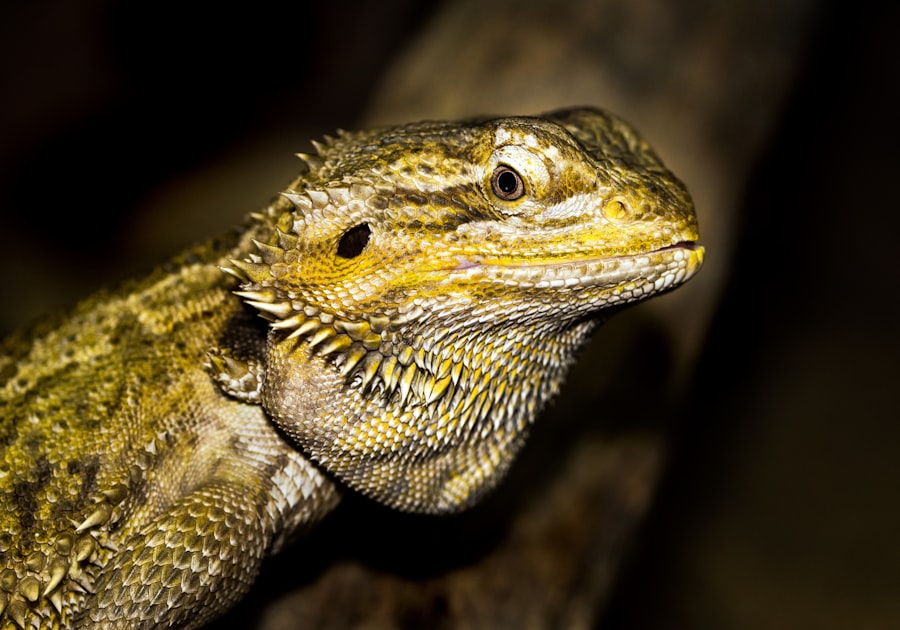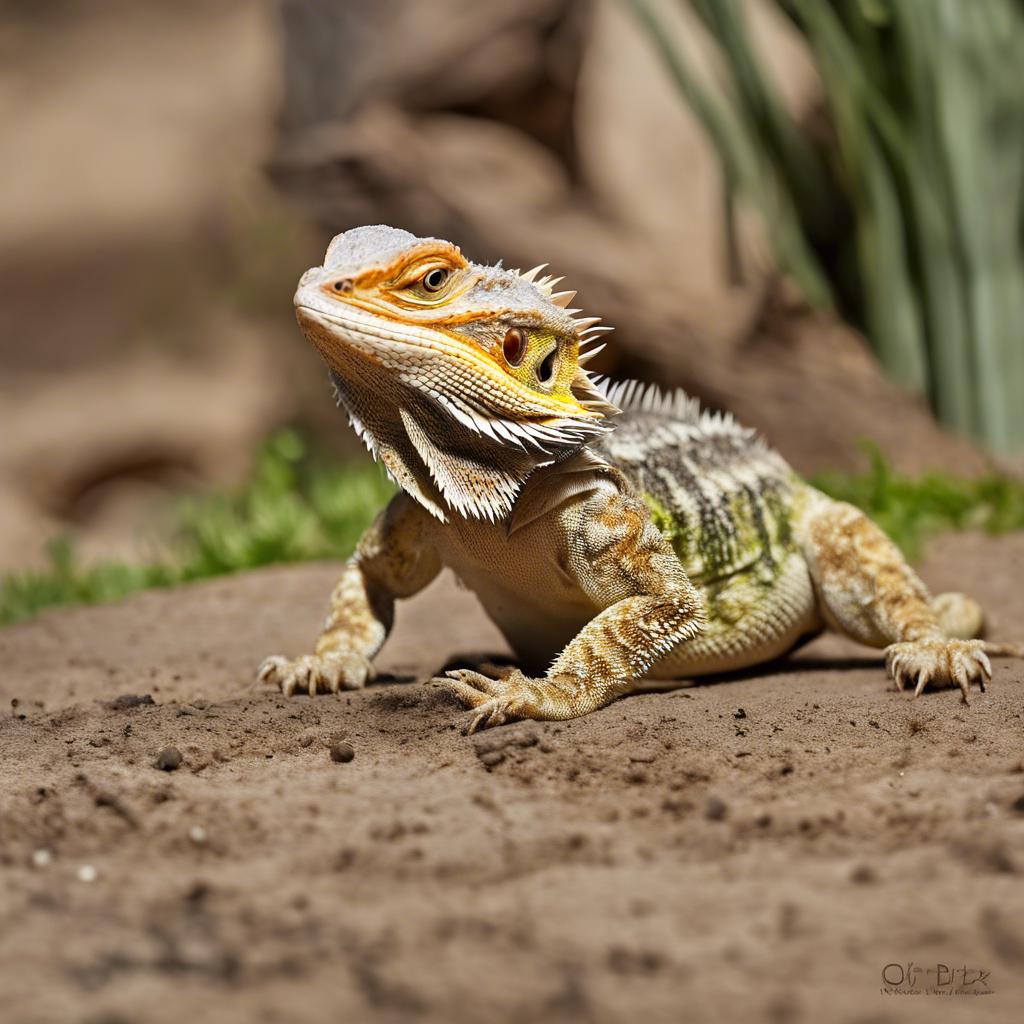Bearded dragons are popular reptile pets known for their unique appearance and docile nature. These lizards are native to Australia and have become increasingly popular as pets due to their low maintenance requirements and friendly demeanor. One of the most important aspects of caring for a bearded dragon is providing them with a balanced diet that meets their nutritional needs.
A balanced diet is crucial for the health and well-being of bearded dragons. These reptiles require a combination of protein, vegetables, fruits, and insects to thrive. A lack of proper nutrition can lead to various health issues, including metabolic bone disease, obesity, and vitamin deficiencies. It is essential for bearded dragon owners to understand the nutritional needs of their pets and provide them with a diverse diet that includes a variety of vegetables.
Key Takeaways
- Bearded dragons are omnivorous and require a balanced diet of both animal protein and vegetables.
- Zucchini is a nutritious vegetable that can be a healthy supplement to a bearded dragon's diet.
- Bearded dragons can eat zucchini, but it should be prepared and served in the correct way.
- Zucchini should be sliced into small pieces and served raw or lightly steamed to retain its nutritional value.
- Bearded dragons should be fed a variety of vegetables in addition to zucchini to ensure a balanced diet and prevent health issues.
Nutritional Value of Zucchini for Bearded Dragons
Zucchini is a versatile vegetable that is commonly consumed by humans. It is low in calories and rich in nutrients, making it a healthy addition to any diet. When it comes to bearded dragons, zucchini can also provide several nutritional benefits.
Zucchini is an excellent source of vitamins A and C, which are essential for the overall health and immune function of bearded dragons. These vitamins help support healthy skin, eyesight, and organ function. Additionally, zucchini contains dietary fiber, which aids in digestion and helps prevent constipation in bearded dragons.
Compared to other vegetables commonly fed to bearded dragons, zucchini offers a unique combination of nutrients. While leafy greens like kale and collard greens are also important components of a bearded dragon's diet, zucchini provides additional vitamins and minerals that may not be as abundant in other vegetables.
Can Bearded Dragons Eat Zucchini?
The answer is yes, bearded dragons can safely eat zucchini. In fact, many bearded dragon owners include zucchini as part of their pet's regular diet. However, it is important to note that zucchini should not be the sole source of nutrition for bearded dragons. It should be offered as a supplement to a varied diet that includes other vegetables, fruits, and insects.
Feeding zucchini to bearded dragons can provide them with additional nutrients and variety in their diet. However, it is essential to prepare and serve the zucchini properly to ensure it is safe and easy for the bearded dragon to eat.
There are some potential risks and benefits associated with feeding zucchini to bearded dragons. On the positive side, zucchini is low in oxalates, which can interfere with calcium absorption in reptiles. This makes zucchini a suitable vegetable for bearded dragons that are prone to calcium deficiencies.
However, it is important to note that zucchini has a high water content, which means it should not be the primary source of hydration for bearded dragons. These reptiles require access to fresh water at all times, and their diet should consist of a variety of foods that provide both hydration and nutrition.
How to Prepare Zucchini for Bearded Dragons
There are several ways to prepare zucchini for bearded dragons. The most common method is to chop the zucchini into small, bite-sized pieces that are easy for the reptile to consume. It is important to remove the seeds and skin before feeding the zucchini to the bearded dragon, as these parts can be difficult for them to digest.
Some bearded dragon owners prefer to cook the zucchini before feeding it to their pets. This can help soften the vegetable and make it easier for the reptile to eat. However, it is important not to overcook the zucchini, as this can lead to a loss of nutrients.
Another option is to grate or shred the zucchini and mix it with other vegetables or insects. This can help encourage bearded dragons to eat the zucchini and ensure they are getting a balanced diet.
When preparing zucchini for bearded dragons, it is important to wash the vegetable thoroughly to remove any pesticides or dirt. Organic zucchini is recommended whenever possible to minimize the risk of exposure to harmful chemicals.
How Much Zucchini Should Bearded Dragons Eat?
The amount of zucchini that should be fed to a bearded dragon depends on several factors, including the age, size, and overall health of the reptile. As a general guideline, adult bearded dragons can be fed small amounts of zucchini two to three times per week. Juvenile bearded dragons may require more frequent feedings of smaller amounts.
It is important not to overfeed bearded dragons with zucchini or any other food. Overfeeding can lead to obesity and other health issues. It is always best to consult with a veterinarian or reptile specialist to determine the appropriate amount of zucchini for your specific bearded dragon.
In addition to zucchini, bearded dragons should also be offered a variety of other vegetables, fruits, and insects to ensure they are receiving a balanced diet. Variety is key when it comes to providing proper nutrition for these reptiles.
Other Vegetables That Bearded Dragons Can Eat

In addition to zucchini, there are several other vegetables that are safe and healthy for bearded dragons to eat. Leafy greens such as kale, collard greens, and mustard greens are excellent sources of vitamins and minerals for these reptiles. Other vegetables that can be included in a bearded dragon's diet include bell peppers, carrots, squash, and green beans.
It is important to note that not all vegetables are safe for bearded dragons. Some vegetables, such as spinach and rhubarb, contain high levels of oxalates and should be avoided. Additionally, certain vegetables may need to be cooked or prepared in a specific way to make them safe for bearded dragons to consume.
Bearded Dragon Care: Providing a Balanced Diet
Providing a balanced diet is one of the most important aspects of caring for a bearded dragon. These reptiles require a combination of protein, vegetables, fruits, and insects to meet their nutritional needs. A lack of proper nutrition can lead to various health issues, including metabolic bone disease, obesity, and vitamin deficiencies.
To ensure a bearded dragon's diet is balanced and nutritious, it is important to offer a variety of foods. This includes a mix of vegetables, fruits, and insects. Each meal should consist of a combination of these food groups to provide the necessary nutrients.
It is also important to monitor a bearded dragon's diet and adjust as needed. As they grow and develop, their nutritional needs may change. Regularly consulting with a veterinarian or reptile specialist can help ensure that the bearded dragon's diet is meeting their specific needs.
Health Issues to Watch Out for When Feeding Bearded Dragons Zucchini
While zucchini can be a healthy addition to a bearded dragon's diet, there are some potential health issues that may arise from feeding them too much or too little zucchini.
Feeding bearded dragons excessive amounts of zucchini can lead to diarrhea and dehydration. This is because zucchini has a high water content and can cause an imbalance in the reptile's digestive system if consumed in large quantities. It is important to monitor the bearded dragon's stool consistency and hydration levels when introducing zucchini into their diet.
On the other hand, not providing enough zucchini or other vegetables can lead to nutritional deficiencies in bearded dragons. These reptiles require a variety of nutrients to support their growth and overall health. It is important to ensure that they are receiving a balanced diet that includes a mix of vegetables, fruits, and insects.
Signs of Overfeeding or Underfeeding Bearded Dragons
It is important for bearded dragon owners to be aware of the signs of overfeeding or underfeeding. These signs can indicate that the reptile's diet is not balanced or meeting their nutritional needs.
Signs of overfeeding in bearded dragons may include obesity, lethargy, and a lack of appetite. These reptiles have a slow metabolism and can easily become overweight if they are fed too much or not provided with enough exercise.
Signs of underfeeding in bearded dragons may include weight loss, decreased activity levels, and a dull appearance. These reptiles require a sufficient amount of food to support their growth and energy needs. If they are not receiving enough nutrients, it can impact their overall health and well-being.
Zucchini as a Healthy Supplement to Bearded Dragon Diet
In conclusion, zucchini can be a healthy supplement to a bearded dragon's diet. It is low in calories and rich in vitamins and minerals that are beneficial for these reptiles. However, it is important to remember that zucchini should not be the sole source of nutrition for bearded dragons.
A balanced diet that includes a variety of vegetables, fruits, and insects is essential for the health and well-being of bearded dragons. Zucchini can be included as part of this balanced diet to provide additional nutrients and variety.
As with any dietary changes, it is important to monitor the bearded dragon's health and adjust their diet as needed. Regular veterinary check-ups can help ensure that the reptile's diet is meeting their specific needs and supporting their overall health. By providing a balanced diet, including zucchini as a healthy supplement, bearded dragon owners can help ensure that their pets live long and healthy lives.
If you're wondering whether a bearded dragon can eat zucchini, you might also be interested in learning about the potential dangers of feeding them certain foods. In a recent article on Reptile Wizard, they discuss the unfortunate case of a bearded dragon that died with its mouth open. This serves as a reminder to be cautious about what we feed our scaly friends. To find out more about the dietary preferences and restrictions of bearded dragons, check out their informative article here. Additionally, if you're curious about other food options for your bearded dragon, you can explore their article on whether bearded dragons can eat black beans here.
FAQs
What is a bearded dragon?
A bearded dragon is a type of lizard that is commonly kept as a pet. They are native to Australia and are known for their distinctive spiny “beard” under their chin.
What do bearded dragons eat?
Bearded dragons are omnivores, which means they eat both plants and animals. Their diet typically consists of insects, vegetables, and fruits.
Can bearded dragons eat zucchini?
Yes, bearded dragons can eat zucchini. Zucchini is a safe and healthy vegetable for them to consume in moderation.
What are the nutritional benefits of feeding zucchini to bearded dragons?
Zucchini is a good source of vitamins and minerals, including vitamin C, vitamin K, potassium, and manganese. It also contains fiber, which can aid in digestion.
How should zucchini be prepared for bearded dragons?
Zucchini should be washed and sliced into small pieces before being fed to bearded dragons. It can be served raw or cooked, but should not be seasoned with any spices or oils.
Can bearded dragons eat the skin of zucchini?
Yes, bearded dragons can eat the skin of zucchini. However, it is important to make sure that the zucchini has been washed thoroughly to remove any pesticides or other contaminants.

